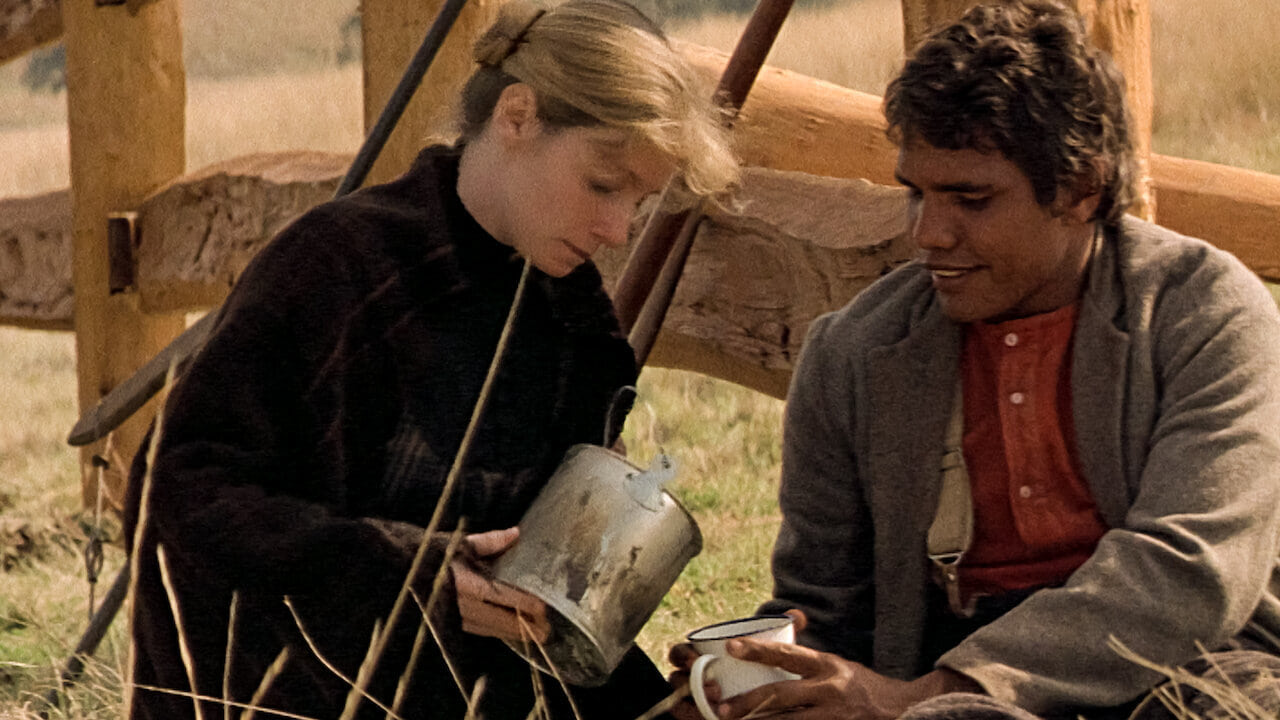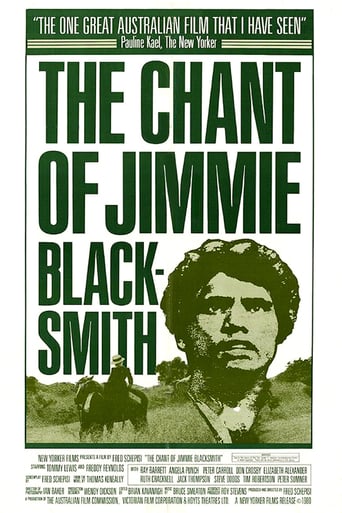BlazeLime
Strong and Moving!
Inclubabu
Plot so thin, it passes unnoticed.
Patience Watson
One of those movie experiences that is so good it makes you realize you've been grading everything else on a curve.
Logan
By the time the dramatic fireworks start popping off, each one feels earned.
bandw
(Spoilers) Jimmy Blacksmith is a young, half-caste Australian Aborigine who has been raised into adulthood by an English minister and his wife. It is 1901 and, as presented, systemic racism is in full effect. To show concern for the Aborigines the minister is intent on "imbuing one with decent ambition." Being half white gives Jimmy an entry into the minister's world, the thinking being that the white half of him might allow him to turn out acceptably well. Jimmy goes along with the thought and tries to fit into the white world, the outcome being that he is tragically caught between two cultures. The minister, seeing that Jimmy has applied himself to getting an education and worked hard, sends him out into the world with a letter of reference. Jimmy takes on fence building at a couple of farms and both times he is given less compensation than agreed on and then given the boot. Then he takes a position with the local police where he obligingly executes the law, even against his own people. After witnessing a monstrous miscarriage of justice he quits that job. Finally Jimmy winds up working on a sheep ranch.The movie is well paced in that with each indignation Jimmy suffers we see his change in attitude from eagerly trying to join the dominate culture to resenting the abuse he suffers because of his race. With each event I also became more indignant. The fuse was set and a sequence of events at the ranch results in a spontaneous explosion of violence. Many may want to avert their eyes during that scene. It left me with conflicting emotions. Everything that happened was perfectly understandable, but hard to condone. When the bad guy finally gets his in a movie, you can usually accept it since he was the bad guy after all. Here the people who are killed are not necessarily bad people. True, they have bought into an evil doctrine, but how many people are independent thinkers enough to buck societal norms?After the killings Jimmy goes on the lam with his brother Mort. The second half of the film deals with tracking them down. And that is not easy, since Jimmy and Mort are skilled at moving about the countryside, being able to move fast and cover their tracks. As a late attempt to stave off the massive search effort Mort and Jimmy take a hostage, a school teacher. The teacher is the unusual person who cares even to think about the problem of racial oppression and how it can lead to violence. He comments to Jimmy and Mort, "You can't say we haven't given you anything. We've introduced you to alcohol, religion, influenza, measles, syphilis, school. A whole host of improvements."The acting is solid, especially considering that playing Jimmy was Tommy Lewis' first screen appearance. The cinematography is noteworthy, with the Australian countryside being used to great effect.Being an American, English subtitles would have helped me.This is based on real events in the life of one Jimmy Governor. Any fictionalized version of real events is always a bit suspect, but this movie has the feeling of authenticity. I hope that is the case, since the movie deals with topics of such gravity that it would be a sin to rewrite the history to any great extent.
Tim Kidner
Fred Schepisi's 1978 film may well be just that but it's not included in my Australian Cinema 12 disc boxed set and I've never known it to be on TV, here. I became aware of it through my old film 'bible' Halliwells and they rated it very highly, awarding a rare maximum score, citing it as 'one of the greatest achievements in Australian cinema'.It's taken me a good number of years to finally find a copy that was on region of DVD I could play and wasn't a silly price.The first thing you notice is the sheer authenticity. Language is as brutal as any and is more akin to a Victorian Scorsese than starched collars and stiff upper lips. The language used to describe the aboriginal natives is as coarse and racist as you'll find in any gritty 70's set LA cop show and for that it is both upsetting and rather embarrassing, but at least goes to show the leaps and bounds humankind has largely made on this issue, since.Jimmie Blacksmith is a half-cast, a subject that has been visited in a few memorable films, particularly 'Rabbit Proof Fence' and as 'these' were often the result of rape against white women, were seen as worse than the lowest. Jimmie (superbly played by Tommy Lewis) does have an advantage, he's overseen by the local white vicar and is known as a hard and honest worker.He soon goes on to work for white farmers, along with his fully aboriginal brother, erecting fences. Miles of them. He does too good a job and they don't want to pay, so he moves on. His relationship with a white girl, then marriage results in a child, that by colour alone, cannot be his. Then, around half-way in, all this pent-up anger boiling up inside the civilised and decent Jimmie erupts. This is when the violence (extreme in its day, now, maybe sadly, average) erupts as he goes on a vengeful killing spree.I need not go further than this, except that obviously, he is then a wanted criminal and a fugitive on the run.There's a real sense of the epic, with cinematic hints and nods to Nicolas Roeg's 'Walkabout', with the natural geography, fauna and the culture all vividly brought to life, superbly filmed by Ian Baker .Thankfully - hopefully, this can now be seen as a historical drama, the like of which can never happen again. It is as hard-hitting and making as powerful a statement on in-bred racism there is and is without doubt a five star classic.
lost-in-limbo
In Australia at the turn of the 19th century a part aboriginal man Jimmie, is torn between two different cultures. One being the traditions of his people and the other is adopting the white customs. Though, the racism he confronts from his white employers, he finds it unbearable trying to fit in and commits a massacre on a white family.This is an adaptation of Thomas Kelly's stimulating novel of the same title. That's actually based on real events. Director Fred Schepisi vision of the story is totally stunning in capturing the detail of the Australian landscape and the friction between two cultures, with such confronting and stirring context and some downright absorbing and strong performances.The look of the film is incredibly impressive. A boldly effectual music score of emotion captures the harsh bushland and gritty desert landscape beautifully. The film is tremendously well shot, with it holding such a noble aurora. The main leads were excellent and potent in their roles, especially the marvellous Tommy Lewis as Jimmie Blacksmith. As well there were some effective supporting roles from some well known Australian faces.The violence is brutal; it comes across as uncomfortable to view at times. Especially the scene involving Jimmie in a fist of rage hacking up some young white girls as the injured mother watches. The violence is supposed to be shocking and it comes across as truly powerful in evoking the tension of racism that is fuelled between the Europeans and Aboriginals. The racism is so vivid and it has some fairly shattering dialogue and scenes of confrontations. The drama is a very heated one, especially the further along the film goes. Though, it doesn't try to twist the side of things giving each their own good and bad traits of the two cultures. We feel sympathy for Jimmie because of his treatment, but not pity because of what he has done, but he has become.The tone of the story is fairly bleak, explicit and uneasy. Though, the emotional effect is never pushed onto you or forced in any way. You just become compelled in the characters and the story, which just sucks you right into the situation at hand. As we see one culture dying because of disease and alcohol and another one being forced upon those. Jimmie is caught between the two ways of life, as he was brought up in his childhood through a white European couple. He can see that his people are losing their identity, him being one. While, he has a stint in doing white customs and achieving his dreams of a job, marriage and own house, but still his treated real badly and at times humiliated by his bosses, in a society that he will never be accepted in. This causes the down ward spiral for Jimmie, as he can't take any more of it.Like some fellow users had typed, this is one depressing film that will stir up some emotion towards the material and characters. It's a tense and fearless look into racism. It comes across as one grand epic and a very good one too.
ptb-8
This film from 1978 as directed by Fred Schipisi of SIX DEGREES fame and of Thomas Keneally's book - he wrote SCHINDLER'S LIST - is a grim and disturbing depiction set during colonial 19th century Australia of a young Aboriginal man's descent into frustrated violence against his white English landowner masters. It becomes a really brutal film with explicit axe murders, especially against young girls and older women, and it is this visually distressing depiction that ultimately alienated the cinema audience. Jimmy's humiliation and cruel treatment is equally explicit and it is a relentless string of unhappy experiences by his inhumane 'boss' that ultimately causes him to crack - and hack. As a novel it is all in the mind of the reader but as a cinemascope color film, the 'running amok with an axe' sequences make any crowd want to run from the cinema. It was not seen on TV in Australia for almost 20 years and it is not likely to be either without most of the violence cut out, thus blunting the heavy handed message and the ultimate impact. Like poor Jimmy himself, the film version is in no man's land either. Past all that, it is a well made film and with an excellent cast; but very tough going. It fits well into a series of very sharply observed Australian films depicting the British colonial mind and its misunderstanding or cruelty towards Aboriginies: JEDDA in 1956, WALKABOUT in 1970, this film in 1978, RABBIT PROOF FENCE in 2001 and THE TRACKER in 2003. Each and every one are unique and excellent in their story. This one however, is the most violent which does derail its message. White urban Australia run amok is hilarious in a 1966 comedy THEY'RE A WEIRD MOB or demented boozy antics in THE ADVENTURES OF BARRY MCKENZIE in 1972... and alarmingly, horrifyingly realistic, soaked in beer bullets fists and dead kangaroos blood in Ted Kotcheff's superb 1971 drama OUTBACK. See the lot! It is a head-shaking but enlightening string of films, especially if seen in chronological order....like we all did! (may explain why our film makers in the 90s made musicals)

